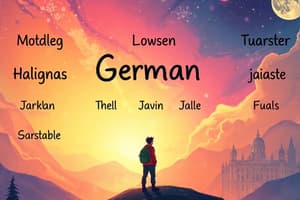Podcast
Questions and Answers
If someone is described as 'krank', what does that mean?
If someone is described as 'krank', what does that mean?
- Tired
- Healthy
- Sick (correct)
- Happy
The German word for 'health' is 'gesund'.
The German word for 'health' is 'gesund'.
False (B)
What is the German term for a medical building or doctor's office?
What is the German term for a medical building or doctor's office?
das Ärztehaus
In German, the word for 'pharmacy' is die ________ .
In German, the word for 'pharmacy' is die ________ .
Match the following German words with their English translations:
Match the following German words with their English translations:
Which of the following is the German word for 'hospital'?
Which of the following is the German word for 'hospital'?
'Die Versicherungskarte' translates to 'prescription' in English.
'Die Versicherungskarte' translates to 'prescription' in English.
What is the German word for 'emergency room'?
What is the German word for 'emergency room'?
The German word for 'appointment' is der/die ________.
The German word for 'appointment' is der/die ________.
Match the German words with their corresponding English translations:
Match the German words with their corresponding English translations:
Which of the following is the German term for 'health insurance'?
Which of the following is the German term for 'health insurance'?
The German word for 'patient' is 'der Arzt'.
The German word for 'patient' is 'der Arzt'.
What is the German term for medicine or medication?
What is the German term for medicine or medication?
A doctor's office or clinic in German is called die ________.
A doctor's office or clinic in German is called die ________.
What does 'Woher kommst du?' mean?
What does 'Woher kommst du?' mean?
'Ich spreche nicht viel Deutsch' means 'I speak German fluently'.
'Ich spreche nicht viel Deutsch' means 'I speak German fluently'.
How do you say 'Can we speak in English, please?' in German?
How do you say 'Can we speak in English, please?' in German?
The German word for 'Monday' is ________.
The German word for 'Monday' is ________.
Match the following days of the week with their German translations:
Match the following days of the week with their German translations:
What is the German word for 'May'?
What is the German word for 'May'?
'Zwanzigste' means 'Twentieth'.
'Zwanzigste' means 'Twentieth'.
What is the German term for 'first' when referring to ordinal numbers?
What is the German term for 'first' when referring to ordinal numbers?
In German, the word for 'Sunday' is ________ .
In German, the word for 'Sunday' is ________ .
Match the following ordinal numbers with their German translations:
Match the following ordinal numbers with their German translations:
Which form of 'sein' (to be) is used with 'du'?
Which form of 'sein' (to be) is used with 'du'?
The correct form of 'haben' (to have) for 'wir' is 'habt'.
The correct form of 'haben' (to have) for 'wir' is 'habt'.
What is the 'ich' form of the verb 'sprechen' (to speak)?
What is the 'ich' form of the verb 'sprechen' (to speak)?
The 'er/sie/es' form of 'lesen' (to read) is ________ .
The 'er/sie/es' form of 'lesen' (to read) is ________ .
Match the pronouns with the correct form of 'können' (can/be able to):
Match the pronouns with the correct form of 'können' (can/be able to):
Which article and case is used in the sentence 'Ich esse den Apfel.'?
Which article and case is used in the sentence 'Ich esse den Apfel.'?
In the sentence 'Ich trinke eine Cola', 'eine' is a masculine article in the Nominative case.
In the sentence 'Ich trinke eine Cola', 'eine' is a masculine article in the Nominative case.
Which case changes only masculine nouns?
Which case changes only masculine nouns?
The Akkusativ form of 'der' is ________.
The Akkusativ form of 'der' is ________.
Match the definite articles with their corresponding gender:
Match the definite articles with their corresponding gender:
If you wanted to say 'I must go to the doctor' using 'müssen', which translation is most accurate?
If you wanted to say 'I must go to the doctor' using 'müssen', which translation is most accurate?
'Ich esse' means 'You eat'.
'Ich esse' means 'You eat'.
What is the 'ihr' form of the verb 'essen' (to eat)?
What is the 'ihr' form of the verb 'essen' (to eat)?
The 'sie/Sie' form of 'müssen' (must) is ________ .
The 'sie/Sie' form of 'müssen' (must) is ________ .
Match the correct conjugation of 'sprechen' (to speak) with its corresponding pronoun:
Match the correct conjugation of 'sprechen' (to speak) with its corresponding pronoun:
Flashcards
Der Termin / Die Termine
Der Termin / Die Termine
An appointment.
Krank
Krank
Sick.
Gesund
Gesund
Healthy / in good health.
Die Gesundheit
Die Gesundheit
Signup and view all the flashcards
Der Krankenwagen
Der Krankenwagen
Signup and view all the flashcards
Das Krankenhaus / Die Klinik
Das Krankenhaus / Die Klinik
Signup and view all the flashcards
Der Arzt / Die Ärzte
Der Arzt / Die Ärzte
Signup and view all the flashcards
Das Ärztehaus
Das Ärztehaus
Signup and view all the flashcards
Die Psychiatrie
Die Psychiatrie
Signup and view all the flashcards
Die Notaufnahme
Die Notaufnahme
Signup and view all the flashcards
Der Patient / Die Patienten
Der Patient / Die Patienten
Signup and view all the flashcards
Die Apotheke
Die Apotheke
Signup and view all the flashcards
Die Krankenversicherung
Die Krankenversicherung
Signup and view all the flashcards
Die Versicherungskarte
Die Versicherungskarte
Signup and view all the flashcards
Die Medizin / Das Medikament
Die Medizin / Das Medikament
Signup and view all the flashcards
erste
erste
Signup and view all the flashcards
zweite
zweite
Signup and view all the flashcards
dritte
dritte
Signup and view all the flashcards
Woher kommst du? / Woher kommen Sie?
Woher kommst du? / Woher kommen Sie?
Signup and view all the flashcards
Welche Sprachen sprichst du? / sprechen Sie?
Welche Sprachen sprichst du? / sprechen Sie?
Signup and view all the flashcards
Können wir bitte Englisch sprechen?
Können wir bitte Englisch sprechen?
Signup and view all the flashcards
Meine Muttersprache ist Englisch.
Meine Muttersprache ist Englisch.
Signup and view all the flashcards
Ich spreche nicht viel Deutsch.
Ich spreche nicht viel Deutsch.
Signup and view all the flashcards
Ich bin
Ich bin
Signup and view all the flashcards
Du bist
Du bist
Signup and view all the flashcards
er/sie/es ist
er/sie/es ist
Signup and view all the flashcards
wir sind
wir sind
Signup and view all the flashcards
ihr seid
ihr seid
Signup and view all the flashcards
sie/Sie sind
sie/Sie sind
Signup and view all the flashcards
ich habe
ich habe
Signup and view all the flashcards
der
der
Signup and view all the flashcards
ein
ein
Signup and view all the flashcards
die
die
Signup and view all the flashcards
eine
eine
Signup and view all the flashcards
das
das
Signup and view all the flashcards
ein
ein
Signup and view all the flashcards
Study Notes
German Health-Related Vocabulary
- "der Termin / die Termine" translates to appointment.
- "krank" means sick.
- "gesund" means healthy or in good health.
- "die Gesundheit" means health.
- "der Krankenwagen" is the word for ambulance.
- "das Krankenhaus / die Klinik" translates to hospital.
- "der Arzt / die Ärzte" means doctor (male).
- "die Ärztin / die Ärztinnen" means doctor (female).
- "das Ärztehaus" refers to a medical building or doctor's office.
- "die Schlosspark-Klinik" is the name of a specific clinic.
- "die Psychiatrie" translates to psychiatry.
- "die Notaufnahme" is the emergency room.
- "der Patient / die Patienten" means patient (male).
- "die Patientin / die Patientinnen" means patient (female).
- "die Apotheke" translates to pharmacy.
- "die Krankenversicherung" means health insurance.
- "die Versicherungskarte" means insurance card.
- "die Medizin / das Medikament" means medicine or medication.
- "das Formular" means form.
- "die Praxis" refers to a medical practice or clinic.
- "das Wartezimmer" is the waiting room.
- "das Mal" means time or occasion.
- "der Morgen" means morning.
- "schonmal" means ever before or already once.
Ordinal Numbers
- 1st = "erste"
- 2nd = "zweite"
- 3rd = "dritte"
- 4th = "vierte"
- 5th = "fünfte"
- 6th = "sechste"
- 7th = "siebte"
- 8th = "achte"
- 9th = "neunte"
- 10th = "zehnte"
- 11th = "elfte"
- 12th = "zwölfte"
- 13th = "dreizehnte"
- 14th = "vierzehnte"
- 15th = "fünfzehnte"
- 16th = "sechzehnte"
- 17th = "siebzehnte"
- 18th = "achtzehnte"
- 19th = "neunzehnte"
- 20th = "zwanzigste"
- 21st = "einundzwanzigste"
- 22nd = "zweiundzwanzigste"
- 23rd = "dreiundzwanzigste"
- 24th = "vierundzwanzigste"
- 25th = "fünfundzwanzigste"
- 26th = "sechsundzwanzigste"
- 27th = "siebenundzwanzigste"
- 28th = "achtundzwanzigste"
- 29th = "neunundzwanzigste"
- 30th = "dreißigste"
- 31st = "einunddreißigste"
Days of the Week and Months
- Monday = Montag
- Tuesday = Dienstag
- Wednesday = Mittwoch
- Thursday = Donnerstag
- Friday = Freitag
- Saturday = Samstag
- Sunday = Sonntag
- January = Januar
- February = Februar
- March = März
- April = April
- May = Mai
- June = Juni
- July = Juli
- August = August
- September = September
- October = Oktober
- November = November
- December = Dezember
Common Questions and Answers
- "Woher kommst du? / Woher kommen Sie?" translates to "Where are you from?".
- "Welche Sprachen sprichst du? / sprechen Sie?" translates to "What languages do you speak?".
- "Können wir bitte Englisch sprechen?" translates to "Can we speak in English, please?".
- "Meine Muttersprache ist Englisch." translates to "My mother tongue is English.".
- "Ich spreche nicht viel Deutsch." translates to "I don’t speak much German.".
Verb Conjugations - Präsens (Present Tense)
- Sein (to be): ich bin, du bist, er/sie/es ist, wir sind, ihr seid, sie/Sie sind
- Haben (to have): ich habe, du hast, er/sie/es hat, wir haben, ihr habt, sie/Sie haben
- Sprechen (to speak): ich spreche, du sprichst, er/sie/es spricht, wir sprechen, ihr sprecht, sie/Sie sprechen
- Lesen (to read): ich lese, du liest, er/sie/es liest, wir lesen, ihr lest, sie/Sie lesen
- Sehen (to see): ich sehe, du siehst, er/sie/es sieht, wir sehen, ihr seht, sie/Sie sehen
- Können (can/be able to): ich kann, du kannst, er/sie/es kann, wir können, ihr könnt, sie/Sie können
- Müssen (must): ich muss, du musst, er/sie/es muss, wir müssen, ihr müsst, sie/Sie müssen
- Essen (to eat): ich esse, du isst, er/sie/es isst, wir essen, ihr esst, sie/Sie essen
Articles & Cases (Der/Die/Das / Ein/Eine)
- Masculine: Definite - der, Indefinite - ein
- Feminine: Definite - die, Indefinite - eine
- Neuter: Definite - das, Indefinite - ein
- Only masculine nouns change in the Akkusativ case.
- Nominative Masculine: der / ein
- Akkusative Masculine: den / einen
- Ich esse den Apfel (the apple).
- Ich trinke eine Cola.
- Ich möchte ein Wasser.
Studying That Suits You
Use AI to generate personalized quizzes and flashcards to suit your learning preferences.




